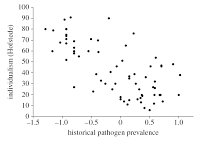Why did the scientific revolution occur in Europe, and not somewhere else? It’s tempting to think that there was something different about the culture of Medieval Europe that set the foundations for the remarkable transformations of the Renaissance – and indeed this is what most historians of science tend to assume (i.e. they don’t subscribe to the ‘accidental’ view of history).
 Christians sometimes claim that Christianity somehow underpins the world view that lead to the enlightenment, although these claims often lack adequate cross-cultural context and some are clearly flawed. Another possibility is that the individualism that is characteristic of European culture may have created a environment in which dogma may be more effectively challenged. The map shows one measure of individualism (The Hofstede Index) – Europe is high in individualism, whereas China and the Middle East are lower.
Christians sometimes claim that Christianity somehow underpins the world view that lead to the enlightenment, although these claims often lack adequate cross-cultural context and some are clearly flawed. Another possibility is that the individualism that is characteristic of European culture may have created a environment in which dogma may be more effectively challenged. The map shows one measure of individualism (The Hofstede Index) – Europe is high in individualism, whereas China and the Middle East are lower.
According to Toby Huff, Professor of Sociology at the University of Massachusetts, it was the “dominating influence of the extended kin group” that acted as a brake on learning and intellectual development in the Islamic world. He writes:
… the particularism of the extended kin group appears to have had a pervasive influence that worked against the development of scholarly guilds or any other autonomous groups – professional, legal, or corporate – which could sustain scientific inquiry and protect it from outside attack. In fact, the traditional, pre-Islamic extended family pattern was reinforced by Islamic law in that it does not recognize corporate personalities, which is why cities and universities and other legally autonomous entities did not evolve there. (Huff, The Rise of Early Modern Science, p81)
 But this just begs the question: why is individualism higher in Europe than in the rest of the Old World? A new paper just out suggests that it was a cultural response to the threat of communicable disease (see ref below). Where disease levels are high, they propose, groups of people may band together and be more likely to reject outsiders.
But this just begs the question: why is individualism higher in Europe than in the rest of the Old World? A new paper just out suggests that it was a cultural response to the threat of communicable disease (see ref below). Where disease levels are high, they propose, groups of people may band together and be more likely to reject outsiders.
What they did was create a composite measure of the prevalence of nine pathogens that are detrimental to human reproductive fitness (leishmanias, trypanosomes, malaria, schistosomes, filariae, leprosy, dengue, typhus and tuberculosis). They then correlated this with a variety of measures of individualism in countries and regions around the world (including the Hofstede Index). For all of them, the correlation was highly significant, with around 50% of the variation in individualism explained by historical pathogen prevalence.
The potential impact on learning and free thinking was not lost on the authors, who conclude:
Pathogen prevalence … may predict cross-cultural differences in practices pertaining to learning and education: where pathogens are prevalent, cultures are likely to encourage modes of learning that emphasize imitation and emulation of prestige in-group members (whereas in less pathogenic environments, there may be greater encouragement for individual experimentation and trial-and-error learning).
The rise of science in the Europe is a complex phenomenon, and no single explanation is likely to suffice. But, with a demonstration of a link between disease burden and cultural attitudes, at least one more piece of the jigsaw seems to have fallen in to place.
Fincher, C.L., Thornhill, R., Murray, D.R., Schaller, M. (2008). Pathogen prevalence predicts human cross-cultural variability in individualism/collectivism. Proceedings of the Royal Society B: Biological Sciences, -1(-1), -1–1. DOI: 10.1098/rspb.2008.0094
Open Access PDF













